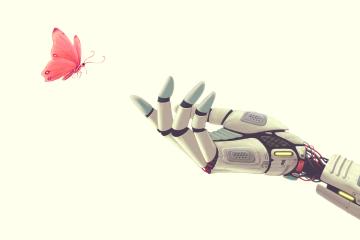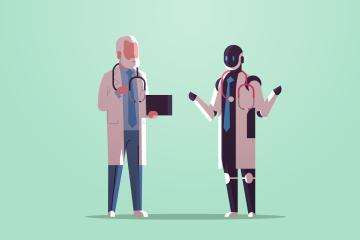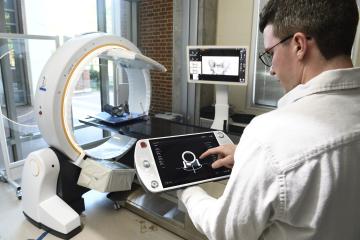Artificial intelligence is already having a profound impact on academic research, discovery, and innovation. On May 15, a group of some of the world's leading AI experts gathered on Johns Hopkins University's Homewood campus to grapple with the great potential—and possible pitfalls—that AI and data science bring to higher education.
The Johns Hopkins AI-X Foundry Symposium on Challenges and Opportunities for AI and Data Science in Academia attracted nearly 400 JHU faculty, students, and staff, and brought together AI experts from John Hopkins, other universities, and industry.
"The opportunities to promote human flourishing presented by this research and its myriad applications are immense, but…so are the risks," said JHU President Ronald Daniels in his opening remarks. He noted that we stand at a pivotal moment in the development of AI, and now need to determine the role universities should play in its future. "This is a chance for all of us to join—and I am confident—advance this vital conversation."
The symposium was moderated by K.T. Ramesh, executive director of the Johns Hopkins AI-X Foundry and senior adviser to the president on AI. Speakers covered a range of topics related to AI and data science, including their potential to improve disease diagnosis and treatment, democratize access to information, and accelerate scientific discovery across disciplines. Speakers also discussed the challenges of adapting to new AI systems, such as the spread of disinformation and economic disruption.
Image caption: President Daniels delivers opening remarks
Image credit: Will Kirk / Johns Hopkins University
Among the presenters was Andrew Moore, former vice president at Google Cloud AI, who underscored the leadership role he believes Johns Hopkins can play in the future of AI. Noting the university's culture of collaboration and breadth and depth of expertise across disciplines, he stated that "Johns Hopkins is the best place to do these beneficial efforts in AI."
Speaker Dana Pe'er, chair of the Computational & Systems Biology Program at Memorial Sloan Kettering Cancer Center, is using AI to understand human biology from the molecular level up to tissue and organs in order to identify new treatments for cancer and to better predict patient outcomes.
"What I really want to do is use AI to find more drug therapies to help more people," she said, noting that because AI is exceptionally skilled at discerning patterns, it can be superior to humans in its ability to identify cancerous tissue.
Jimmy Lin, professor and chair in software systems at the University of Waterloo's David R. Cheriton School of Computer Science, spoke about AI's huge potential to do good while also acknowledging "the biggest challenge in five to 10 years will be economic disruption," including initial temporary job loss. But, he explained, AI also will lead to the creation of many new professions and employment opportunities. "You have to consider that with the invention of spreadsheets, the employment rate of bookkeepers went down, but there was also an increase in auditors, accountants, etc. It's the same with AI," he said.
Other leading experts who presented included Thomas Dietterich, professor emeritus at Oregon State University's School of Electrical Engineering and Computer Science; Oren Etzioni, founding CEO of the Allen Institute for Artificial Intelligence; and Henry Kautz, professor emeritus of computer science at the University of Rochester.
Johns Hopkins experts joined the invited speakers for a panel discussion moderated by Alexis Battle, associate professor of biomedical engineering and deputy executive director of the Johns Hopkins AI-X Foundry. During the session, panel members fielded questions from the audience covering a variety of issues related to the opportunities and risks AI presents. A recurring theme was the need for foundational statistics, probability, and design thinking to help interpret and make the best use of AI.
Alan Yuille, a Bloomberg Distinguished Professor of computer science and cognitive science, spoke about the need to improve the testing of AI before it is deployed.
"We should move more toward trying to find AI's failures so we can find its faults," he said.
Other JHU panelists included Rama Chellappa, a Bloomberg Distinguished Professor in electrical and computer engineering and biomedical engineering and chief scientist for the Institute for Assured Autonomy; Elana Fertig, a professor of oncology and director of Oncology Quantitative Sciences; and Elizabeth Stuart, Bloomberg Distinguished Professor of American Health.
According to Ramesh, the issues raised at the symposium are precisely the kinds of challenges that the AI-X Foundry was created to address.
"Today and in years to come, the AI-X mission of humans and AI learning from each other for the betterment of all will be crucial to achieving Johns Hopkins' goals, as underscored in President Daniels' Ten for One plan. This plan prioritizes our role as leaders in AI and data science to amplify the impact of our discoveries for the world," said Ramesh. "AI is fueling a revolution in how we conduct research, in how we teach and learn, and in our capacity to effect change."
Symposium organizers included Alexis Battle, Rama Chellappa, Mark Dredze, K.T. Ramesh, Alex Szalay, and Alan Yuille.
Members of the Johns Hopkins community who are interested in getting involved and learning more about the AI-X Foundry can email ai@jhu.edu.
Posted in Science+Technology, Voices+Opinion
Tagged artificial intelligence, data science











